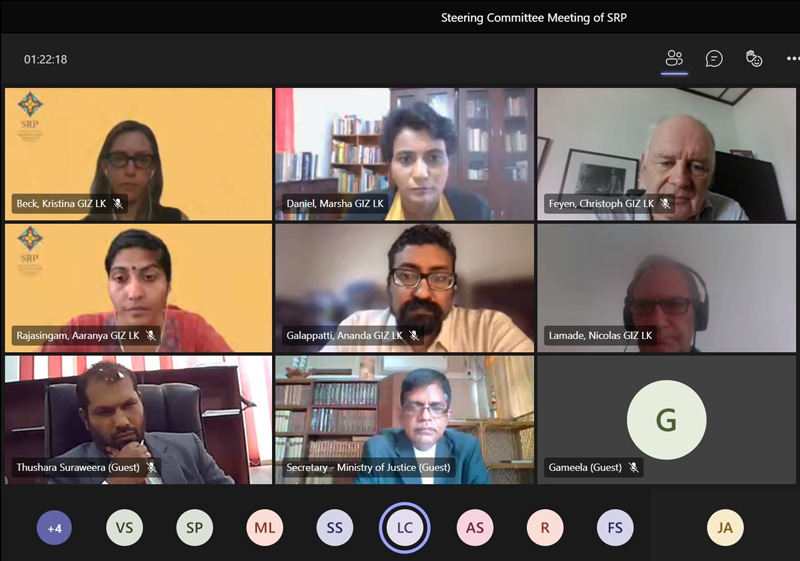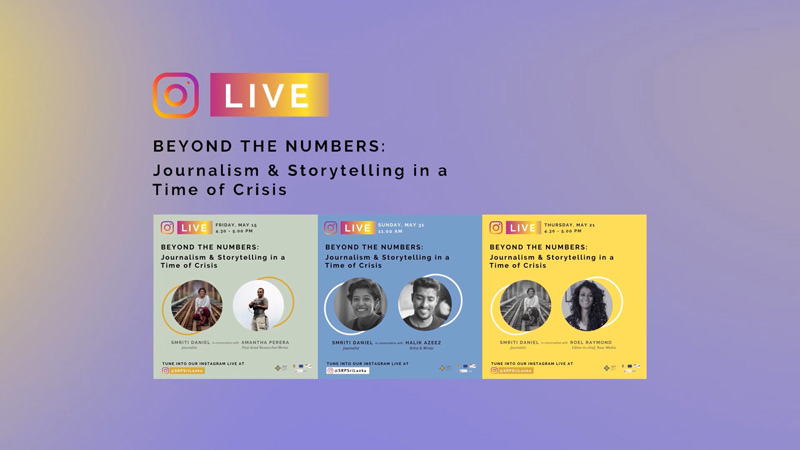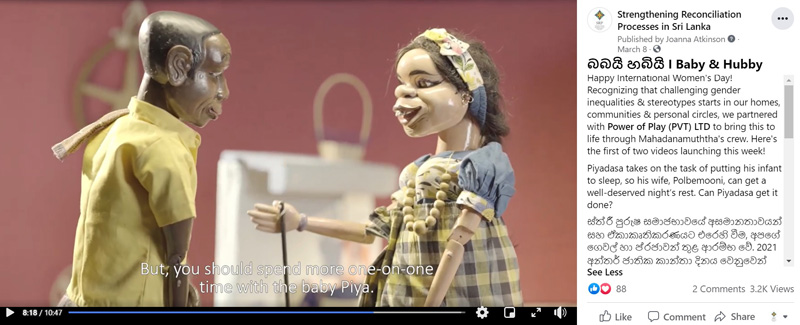Monday Feb 23, 2026
Monday Feb 23, 2026
Tuesday, 25 May 2021 01:02 - - {{hitsCtrl.values.hits}}

SRP’s Steering Committee meeting in progress.
|
“It’s About Time”, the traveling museum which drew over 18,000 visitors to physical events in 2019, is currently being designed into an interactive, virtual museum.
|
The multi-stakeholder steering committee of the project ‘Strengthening Reconciliation Processes in Sri Lanka (SRP)’ convened online on Friday to assess the project’s progress since the outbreak of the COVID-19 crisis in March 2020, in light of the unprecedented challenges.
To date SRP has reached over eight million through multimedia campaigns, as well as directly targeted 100,000 people around the country through initiatives aimed at building dialogue, skills and supporting diverse communities.
SRP works with government, non-government and grassroots entities in seven fields of action to strengthen national reconciliation processes. The four-year project running from 2017 to 2021, is jointly funded by the European Union (EU) and the German Federal Foreign Office and implemented by Deutsche Gesellschaft Für Internationale Zusammenarbeit (GIZ) GmbH and the British Council, in partnership with the Ministry of Justice which holds the portfolio for reconciliation and social cohesion.
SRP is closely guided by a steering committee comprising six government organisations, SRP’s commissioning partners, and members of civil society. Secretary to the Ministry of Justice M.M.P.K. Mayadunne chaired the meeting with the Delegation of the EU to Sri Lanka and Maldives Head of Cooperation Frank Hess. German Embassy Deputy Ambassador Andreas Berg also attended the meeting.
SRP quickly adapted to the ‘new normal’ resulting from the COVID-19 pandemic. The project worked closely with its partners at all levels to revise current activities from physical to digital formats. Capacity development initiatives, involving training on problem solving and conflict mitigation for 168 local government officials, workshops for 350 youth to improve their social media literacy in countering hate speech, and mentoring journalists shifted to online forums. Dialogue-based events for public engagement, some at a policy level, took the form of Facebook and Instagram Lives with outreach and engagement in the range of 500-5,000, bringing together diverse people on the arts, journalism, gender-based issues, and social media regulation to name a few.
While the pandemic presented challenges to all of SRP’s initiatives, ‘It’s About Time,’ SRP’s traveling museum under its Historical Dialogue component, and arts and film festivals in partnership with local universities – both of which drew thousands to the physical events in 2018 and 2019 in the Central, Southern and Northern Provinces of Sri Lanka – faced the biggest challenge. The project tackled this challenge by developing an interactive virtual museum, which is currently in the design phase. SRP’s arts component developed a trilingual facilitator’s guide, ‘Facilitating Dialogue for Critical Engagement with Art,’ so partners have guidelines on how they can implement dialogue-based arts events such as film festivals at a smaller scale and understand how to navigate challenges with regard to content and conflict sensitivity.
Tapping into communities of practice proved valuable for psychosocial support initiatives where over 170 psychosocial practitioners were able to convene regularly online, share information and direct resources in response to COVID-19, which has raised an unparalleled need, globally, for mental health and psychosocial support.
The Technical Advisor for Psychosocial Support at SRP indicated, “some contexts and forms of engagement are particularly hard to move online or deliver remotely, especially if the people you are working with don’t have easy access to phones or the internet.” This meant that some activities required a different approach. A home gardening initiative was implemented to sustain food security and the livelihoods of women’s self-help groups in rural areas of five districts in the Northern and Eastern Provinces. This helped women in small communities to work from home, being COVID-cautious, and support each other mentally and emotionally.
SRP’s Language component adopted a hybrid approach with face-to-face events for smaller numbers and online workshops for larger numbers in bilingual language training, including online delivery and e-moderation methodology, for 325 public service personnel.
As SRP prepares for its end-of-project external evaluation in December 2021, Additional Secretary Reform Thushara Suraweera, offered the Ministry’s continued support in completing the project’s initiatives. The Delegation of the EU to Sri Lanka and Maldives stated that a proposal is being developed for a follow-on project in line with the EU’s multi-annual indicative process in planning future assistance to Sri Lanka. “The ideas have been presented to our headquarters, and we are confident a new program on the basis of the ideas presented will be implemented, of course with the consultation and concurrence of the Sri Lankan Government,” said Frank Hess.
“We look forward to the discussions and to more effective and efficient engagement going forward,” concluded the Secretary Mayadunne.

SRP’s first series of Instagram Lives during the first lockdown in May 2020.

SRP’s International Women’s Day 2021 campaign featured a social media video series in partnership with Power of Play (PVT) LTD.